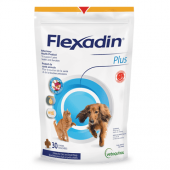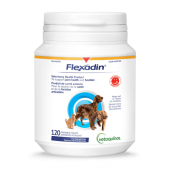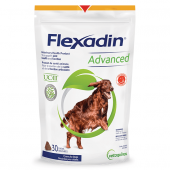1: Feed your dog a healthy and balanced diet.
Food containing all the necessary nutrients in adequate quantities provides your dog with optimal energy and a strong immune system. It also helps them achieve or maintain a healthy weight, which is a crucial part of managing many conditions such as diabetes and osteoarthritis. Ask your veterinary clinic for recommendations based on your dog’s age, size, lifestyle and any existing medical conditions. Specially formulated food can help meet your dog’s unique needs, such as dental care, weight control or gastrointestinal health.
2: Help your dog get plenty of exercise.
Regular physical activity helps your dog build strong muscles and a robust cardiovascular system to remain mobile and prevent injury. Along with nutrition, it’s also an excellent way for your dog to keep calories in check. Whether it’s through a brisk walk around the block, hiking in the forest or swimming in a large in-ground pool, there are plenty of ways to work out alongside your pup. Dogs’ exercise requirements vary according to their breed, age, and personality: do some research to make sure yours is active enough.
3: Keep your dog mentally stimulated.
If your dog is feeling bored, stressed, or anxious, they may grow sedentary or engage in destructive behaviour. Give your dog plenty of stimulation by allowing them to sniff whatever piques their interest during their daily walk and by challenging them through games or puzzles. Training and teaching your dog new tricks are also fantastic ways to keep their mind sharp and help delay the decline of cognitive functions during their senior years.
4: Groom your dog regularly.
While some breeds require more grooming than others, all dogs may come to enjoy a good brushing session. Doing so helps prevent matting, removes dirt and debris, and distributes their skin’s natural oils for a shiny, healthy coat. Trimming your dog’s nails regularly helps avoid discomfort and mobility issues, while cleaning their ears can help prevent infections. Finally, grooming your furry friend allows you to inspect their body for anything unusual, such as signs of parasites or allergy-related skin issues you may otherwise not have noticed.
5: Visit your veterinary clinic regularly.
Schedule at least one annual wellness exam with a veterinarian for your dog, and plan more frequent visits if they’re a growing pup or if a medical condition requires it. This may allow your veterinarian to detect health issues early and provide treatment before complications arise. They’ll also recommend vaccination and parasite prevention to protect your companion against life-threatening diseases based on their lifestyle and environment.






